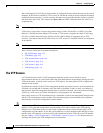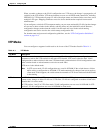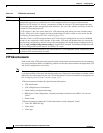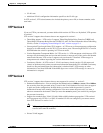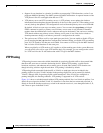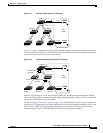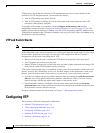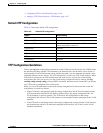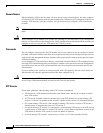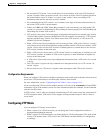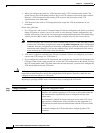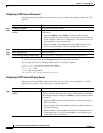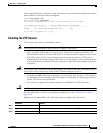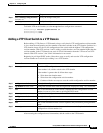
14-10
Catalyst 2960 and 2960-S Switch Software Configuration Guide
OL-8603-09
Chapter 14 Configuring VTP
Configuring VTP
Domain Names
When configuring VTP for the first time, you must always assign a domain name. You must configure
all switches in the VTP domain with the same domain name. Switches in VTP transparent mode do not
exchange VTP messages with other switches, and you do not need to configure a VTP domain name
for them.
Note If NVRAM and DRAM storage is sufficient, all switches in a VTP domain should be in VTP server
mode.
Caution Do not configure a VTP domain if all switches are operating in VTP client mode. If you configure the
domain, it is impossible to make changes to the VLAN configuration of that domain. Make sure that you
configure at least one switch in the VTP domain for VTP server mode.
Passwords
You can configure a password for the VTP domain, but it is not required. If you do configure a domain
password, all domain switches must share the same password and you must configure the password on
each switch in the management domain. Switches without a password or with the wrong password reject
VTP advertisements.
If you configure a VTP password for a domain, a switch that is booted without a VTP configuration does
not accept VTP advertisements until you configure it with the correct password. After the configuration,
the switch accepts the next VTP advertisement that uses the same password and domain name in the
advertisement.
If you are adding a new switch to an existing network with VTP capability, the new switch learns the
domain name only after the applicable password has been configured on it.
Caution When you configure a VTP domain password, the management domain does not function properly if you
do not assign a management domain password to each switch in the domain.
VTP Version
Follow these guidelines when deciding which VTP version to implement:
• All switches in a VTP domain must have the same domain name, but they do not need to run the
same VTP version.
• A VTP version 2-capable switch can operate in the same VTP domain as a switch running VTP
version 1 if version 2 is disabled on the version 2-capable switch (version 2 is disabled by default).
• If a switch running VTP version 1 but capable of running VTP version 2 receives VTP version 3
advertisements, it automatically moves to VTP version 2.
• If a switch running VTP version 3 is connected to a switch running VTP version 1, the VTP version
1 switch moves to VTP version 2, and the VTP version 3 switch sends scaled-down versions of the
VTP packets so that the VTP version 2 switch can update its database.
• A switch running VTP version 3 cannot move to version 1 or 2 if it has extended VLANs.



